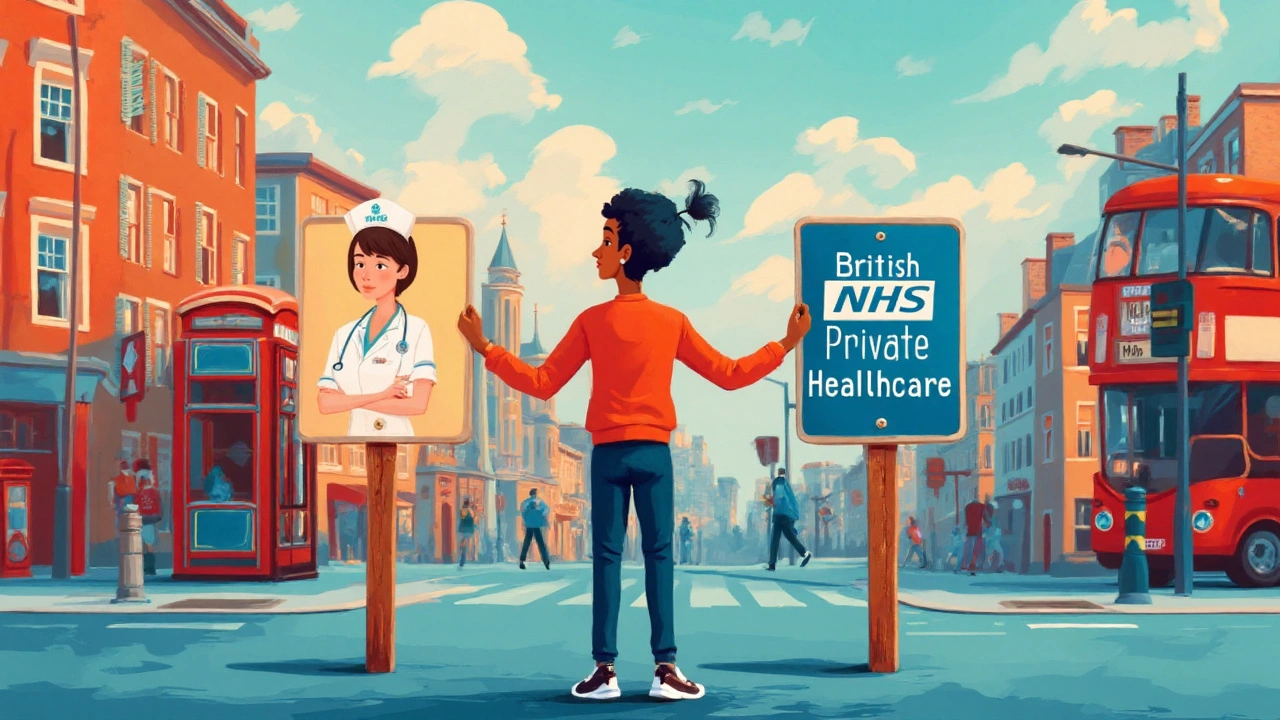 Aug, 4 2025
Aug, 4 2025
Picture this: you wake up with a throbbing knee, the same one that's been bugging you for ages. You finally get your GP to refer you, but the wait time just for an initial consultation drags on for 28 weeks. Seems wild, right? That’s not some horror story—those are real NHS waiting times as reported by the BBC in July 2025. When your health feels like it’s on the clock, it’s hard not to wonder: is private healthcare actually better than sticking with the NHS in the UK?
The Big Divide: What Sets Private Apart From NHS?
So let’s lay out the basics. The NHS is free at the point of use, funded by taxes, and covers almost everything from broken arms to chronic illnesses. You don’t swipe a card or get a bill. But there’s a catch—demand has exploded. In 2025, over 7.7 million people in England are on NHS waiting lists, with some folks waiting over a year for non-urgent treatment. Go private, though, and you skip the queue. Appointments can take days, not months. Tests, scans, surgeries—they can all move fast, as long as you can pay or have health insurance.
One of the biggest things that draws people to private care is control. Choose your own doctor, pick your appointment times (sometimes even evenings and weekends), book in at a clean, modern hospital—often with tasty food and your own room. Doesn’t sound rough, does it?
But here’s a twist. Those bells and whistles? They’re not always about the treatment itself. Surgeons, specialists, and nurses often work privately and for the NHS. Your consultant might be the same person both places. The drugs and tests are often identical too. What’s really different is the experience: the speed of access, the comfort, the convenience, and yes—to be blunt—the price tag.
Money’s the sticking point. Self-pay knee surgery in London in 2025 often costs £11,000-£15,000. A single MRI scan can be £350-£800. Insurance can take the sting out, but policies aren’t cheap and usually don’t cover chronic or pre-existing problems. The NHS, for all its frustrations, will care for you from cradle to grave, no bill in sight.
It’s not all pro-NHS though. Hospital hygiene, food, and privacy often get called out as comfort gaps. Another issue is choice: NHS patients rarely get to pick their consultant, hospital, or timing. That matters when you’re worried or want the best odds for a tough diagnosis.
Still, there’s a hard fact: if anything goes seriously sideways, or if you wind up needing complex, expensive intensive care (think: a big heart attack, a life-or-death emergency), almost every private hospital in the UK transfers you to an NHS facility. The NHS packs the expertise and facilities for critical care, organ transplants, neonatal ICUs—the big stuff. Private care is great for planned treatments and routine surgery, but no one is flying in helicopters to Bupa’s plushest suite in a true crisis.

Quality, Speed, and Hidden Pitfalls: What You Really Get
Speed is the strongest selling point for the private sector. In 2025, the median wait for a NHS hip replacement is over 36 weeks. Private? More like two or three. For scans, a GP may refer you to an NHS MRI with a lead time of 7-12 weeks; private imaging centers can often slot you in next day. It’s no wonder record numbers, nearly 300,000 Britons in the first half of 2025, have paid privately for treatment, according to the Independent Healthcare Providers Network.
Privacy’s another next-level draw. NHS wards are often busy and noisy, and there’s rarely a guarantee you’ll get a side room unless it’s medically needed. Private hospitals advertise ensuite bathrooms and even Netflix-enabled TVs—feel-good perks for anxious patients.
Yet, outcomes—meaning, your chance of getting better—are basically the same in most cases. The care guidelines, surgery standards, and drugs are closely regulated, whether private or NHS. If you’re getting a standard procedure like cataract surgery from the same surgeon, there’s little evidence you’ll have better clinical results just by going private. The real difference shows up in experience, convenience, and sometimes peace of mind.
There are gotchas, though. Private healthcare doesn’t always cover you if things go wrong. If you start bleeding badly after an operation or need intensive monitoring, you might get blue-lighted back to the nearest NHS hospital. That’s because private hospitals don’t always have 24/7 intensive care or on-site emergency resources. It’s something insurers rarely shout about, but ask anyone working in both sectors—they’ll tell you it’s the reality.
Another quirk: pre-existing and chronic disease. Private plans usually don’t include diabetes, asthma, or heart failure. You’re often covered for ‘acute’ new issues or injuries, but the NHS pulls the heavy weight on lifelong illnesses. If you have cancer, some plans only pay for diagnosis or initial treatment but not costly long-term drugs—again, NHS remains your fallback or mainstay.
Here’s a weird but real example: if you hurt your knee and need an urgent MRI scan, some insurers now make you wait several weeks or ask you to go via the NHS first. Why? It’s cheaper for them. So sometimes, private care isn’t the get-out-of-jail card it looks like. And if you’re older, buying new cover can get expensive or require medicals, or simply get declined.
Don’t overlook hidden fees. Many packages don’t include follow-up care like physio, medication, or complications. Always check the small print, or you might be out of pocket.
Think you’ll never need to think about this stuff? NHS data shows about 12% of adults in the UK now have some form of private health insurance—double what it was a decade ago. Most say it’s because of NHS waiting times, rather than luxury perks.

Who Should Go Private (and Why) – Real-Life Tips
If you’re young, healthy, and just want the peace of mind of skipping a queue in case you ever bust a tooth or need a quick checkup, a basic private health policy can make sense. Pay as you go (self-pay) for one-off treatments is growing fast, particularly for diagnostics (scans, blood tests) and standard procedures (like hernia repairs or cataracts) where costs are predictable. But run the numbers—those costs add up quickly if you get unlucky.
If you’re managing a lifelong illness or you’re over 65, the NHS is actually still your best bet for ongoing care. Chronic conditions, emergency admissions, and complicated surgeries are better supported by the resources of the public sector.
If you have no insurance or funds for private care, don’t worry—no one’s saying the NHS doesn’t deliver good results. NHS doctors and nurses are among the best trained globally. You might just need to pack some patience, or push hard for referrals or second opinions.
But let’s say you need an operation soon (like a gallbladder removal or knee arthroscopy) and can’t wait months—this is where private healthcare can make a life-altering difference. Quicker surgery means getting back to work sooner, less pain, and reduced risk of complications from waiting. You don’t need to cancel your NHS slot—many people go private for surgery but continue the rest of their care in the NHS. It’s totally allowed, as long as you don’t double dip for the same treatment.
Parents pay privately for children’s procedures too—anything with a long wait or that affects schooling, like tonsil removals or orthodontic care, are popular choices. Maternity’s a mixed bag; most UK women still choose NHS for safety, since emergencies go to the NHS anyway. But, if you want a plush suite and the same midwife throughout, private packages exist (if you have deep pockets).
Don’t forget the middle ground. Many employers offer health insurance as a benefit, or cash plans that refund costs for dental, optical, or physiotherapy. Worth checking your job perks before you spend out of your own pocket.
If you do go private, always research the consultant’s credentials and ask direct questions about what happens if things don’t go smoothly. Will you get quick access to follow-up, or be left in limbo? Ask about ALL costs—surgery, tests, drugs, aftercare—before signing anything.
And if you’re unsure, mix and match. Get your diagnosis on the NHS, get a second opinion privately, or use private care for faster scans but NHS for major surgeries. Loads of savvy Brits use both systems together—no shame in wanting the best of both worlds.
No one-size-fits-all answer here. Some folks never leave the NHS and do fine, while others say going private changed their life. If money’s tight, stick with the NHS—you’re not alone, and you’re not getting a second-class service. But if waiting is making your life miserable and you have the cash, private care can be a real lifesaver for peace of mind and speed.
